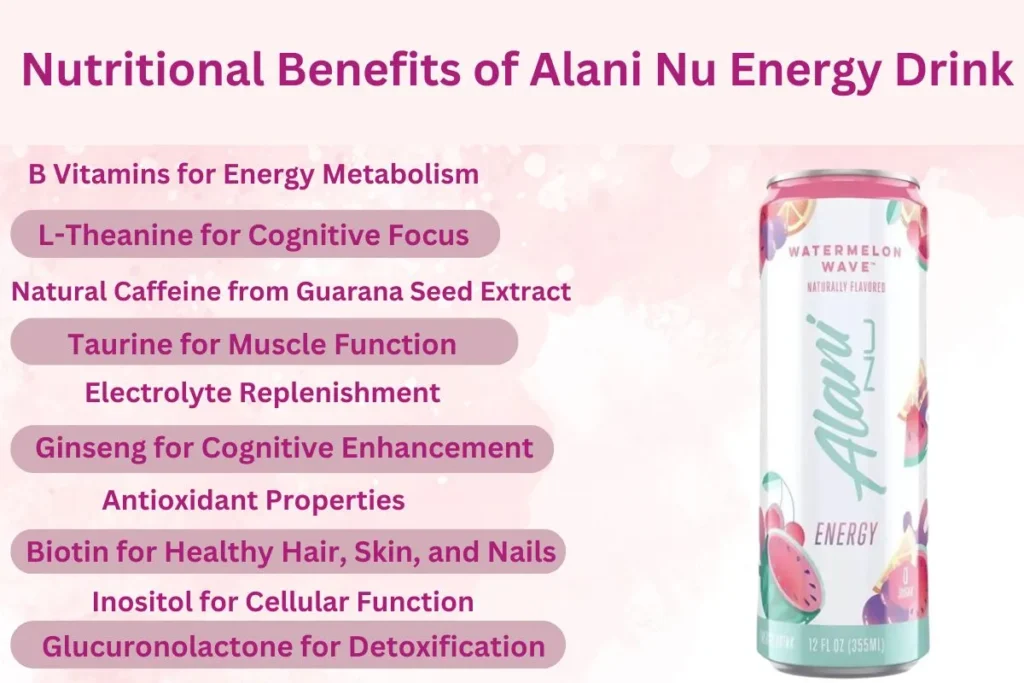The Alani Nu Energy Drink has become a well-liked option for people looking for a consistent energy boost without all the negative effects of regular caffeinated drinks. In the realm of health and fitness, it has drawn interest due to its potential to provide prolonged energy and concentration.
Marketed as a health-conscious alternative to traditional energy drinks, Alani Nu promises to deliver sustained energy without the crash often associated with other caffeinated beverages. To assist you in making an informed decision about introducing Alani Nu Energy Drink into your routine, this article examines the components, advantages, and factors to consider “Is Alani Nu Energy Drink Good For You”.
The Background of Alani Nu Energy Drink
Alani Nu Energy Drink traces its roots back to the vision of fitness enthusiasts and entrepreneurs, Katy Hearn and Haydn Schneider. The brand was founded with a mission to provide high-quality, performance-focused supplements and beverages to support individuals in their fitness journeys.
The journey began with the launch of Alani Nu, a line of supplements designed to meet the needs of women in the fitness community. Recognizing the demand for clean and effective energy supplements, the founders saw an opportunity to expand their product offering to include a refreshing and energizing beverage.
Drawing inspiration from their own experiences and the desires of their customers, Katy and Haydn set out to create a beverage that would deliver a boost of energy without compromising on taste or quality. After extensive research and development, Alani Nu Energy Drink was born.
Launched with a range of delicious flavors and a commitment to transparency and integrity, Alani Nu Energy Drink quickly gained popularity among fitness enthusiasts, athletes, and health-conscious individuals alike. Its pure recipe, devoid of artificial tastes and sugars, drew in customers looking for a more healthful option than conventional energy drinks.
Over the years, Alani Nu Energy Drink has continued to evolve, introducing new flavors and innovations to meet the changing needs of its diverse customer base. Today, it remains a trusted name in the world of fitness and wellness, beloved for its effectiveness, taste, and commitment to quality.
As Alani Nu Energy Drink looks to the future, it remains dedicated to its founding principles of providing clean, effective, and delicious products to support individuals in achieving their fitness and lifestyle goals. With a focus on innovation and customer satisfaction, the brand continues to inspire and empower individuals to live their best lives, one refreshing sip at a time.
List of Ingredients in Alani Nu Energy Drink
Alani Nu Energy Drink prides itself on using high-quality ingredients to deliver a refreshing and energizing beverage. While specific formulations may vary depending on the flavor and variety, Here is an in-depth look at the list of ingredients in Alani Nu Energy Drinks:
- Carbonated Water: This is the base ingredient that gives Alani Nu its fizzy, bubbly texture. Carbonated water is simply water that has been infused with carbon dioxide gas under pressure.
- Citric Acid: A naturally occurring acid found in citrus fruits like lemons and limes. In Alani Nu, it acts as a preservative and provides a tart, sour flavor note.
- Taurine: An amino acid that is one of the most common ingredients found in energy drinks. Taurine is believed to have antioxidant properties and may play a role in cardiovascular health and muscle function.
- Erythritol: A zero-calorie sugar alcohol used as a sweetener in Alani Nu. Erythritol does not spike blood sugar and insulin levels like regular sugar.
- Sodium Citrate: This acts as both a flavor enhancer by amplifying the citrus notes, as well as a preservative to extend shelf life.
- L-Theanine: An amino acid found naturally in green tea leaves. L-theanine is included for its purported ability to promote calmness and reduce the “jittery” feelings sometimes associated with caffeine consumption.
- Caffeine: The primary energizing ingredient, each can of Alani Nu contains around 200mg of caffeine derived from sources like guarana and green coffee beans.
- Sucralose: An artificial, no-calorie sweetener used in place of sugar. Sucralose measures around 600 times sweeter than regular table sugar.
- Panax Ginseng Extract: An herb used in traditional Chinese medicine, believed to help improve focus, concentration and physical endurance.
- Sodium Benzoate/Potassium Sorbate: Food preservatives that inhibit microbial growth to prevent spoilage.
- L-Carnitine Tartrate: A form of L-carnitine, an amino acid that helps transport fatty acids to be burned for energy in the mitochondria of cells.
- Acesulfame Potassium (Ace-K): Another high-intensity artificial sweetener around 200 times sweeter than sugar.
- B Vitamins: Includes niacin, vitamins B6, B12, pantothenic acid and biotin. These support energy metabolism and converting nutrients into cellular fuel.
- Glucuronolactone: A naturally occurring compound found in plant gums, added to energy drinks for its potential energizing effects though more research is needed.
- Remaining ingredients: The remaining ingredients like natural flavors, gum arabic, salt, citric acid, malic acid and colors are used for flavoring, texture and appearance.
Alani Nu Energy Drink Nutritional Information
The nutrition label on Alani Nu Energy Drink provides valuable insights into its composition and potential impact on your daily dietary needs. Each 12-ounce serving contains a modest 10 calories, making it a low-calorie option for those seeking an energy boost without excessive caloric intake. Additionally, the drink is free from total fat, contributing zero grams to your daily fat consumption.
While Alani Nu Energy Drink contains 80 milligrams of sodium, this amount accounts for only 3% of the recommended daily value, making it a relatively low-sodium beverage. The carbohydrate content is minimal, with only 2 grams of total carbohydrates per serving, contributing less than 1% of the daily value. Notably, the drink contains no added sugars, relying instead on 2 grams of sugar alcohols for sweetness.
Despite its lack of traditional macronutrients, Alani Nu Energy Drink packs a punch with its micronutrient and functional ingredient profile. It provides 100% of the daily value for calcium pantothenate (vitamin B5), a critical nutrient for energy metabolism and overall cellular function.
One of the standout ingredients in Alani Nu Energy Drink is L-theanine, an amino acid known for its ability to promote relaxation and cognitive focus. Each serving contains 200 milligrams of this compound, which can potentially enhance mental clarity and counteract the jittery effects of caffeine.
Taurine, another amino acid present in the drink, is included at a substantial 2,000-milligram dose. Taurine is believed to support muscle function and recovery, making it a valuable addition for those engaging in physical activities.
As the star ingredient, caffeine is present at a substantial 200-milligram level per serving, accounting for 225% of the recommended daily intake. While this caffeine content can provide an immediate energy boost, it’s essential to monitor your overall caffeine consumption from all sources to avoid potential adverse effects.
Alani Nu Energy Drink also contains a blend of electrolytes, which can aid in hydration and muscle function, particularly during physical exertion. Additionally, it includes Panax ginseng root extract, L-carnitine tartrate, glucuronolactone, and guarana seed extract, each offering potential benefits ranging from cognitive enhancement to antioxidant properties and sustained energy release.
| Nutrient | Amount | Daily Value (%) |
| Calories | 10 | 0.50% |
| Total Fat | 0 | – |
| Sodium | 80 | 3% |
| Total Carbohydrates | 2 | <1% |
| Sugars | 0 | 0% |
| Sugar Alcohols | 2 | – |
| Dietary Fiber | 0 | – |
| Protein | 0 | – |
| Calcium Pantothenate (B5) | 5 | 100% |
| L-Theanine | 200 | – |
| Taurine | 2000 | – |
| Caffeine | 200 | 225% |
| Electrolytes | Yes | – |
| Panax Ginseng Root Extract | Yes | – |
| L-Carnitine Tartrate | Yes | – |
| Glucuronolactone | Yes | – |
| Guarana Seed Extract | Yes | – |
Nutritional Benefits of Alani Nu Energy Drink

While Alani Nu Energy Drink is primarily marketed as a source of an immediate energy boost, it does contain certain ingredients that offer potential nutritional benefits. However, it’s important to note that these benefits may be minimal or insignificant for individuals who already consume a well-balanced diet.
B Vitamins for Energy Metabolism
Alani Nu Energy Drink is fortified with a range of B vitamins, including niacin (vitamin B3), vitamin B6, vitamin B12, biotin, and pantothenic acid. These water-soluble vitamins play crucial roles in energy metabolism by supporting the conversion of food into usable energy for the body.
Specifically, B vitamins aid in the breakdown of carbohydrates, fats, and proteins, facilitating the production of adenosine triphosphate (ATP), the primary energy currency for cellular processes. By ensuring adequate levels of these vitamins, Alani Nu Energy Drink may contribute to improved energy levels and reduced fatigue.
L-Theanine for Cognitive Focus
Another notable ingredient in Alani Nu Energy Drink is L-theanine, an amino acid naturally found in green tea leaves. L-theanine is believed to promote a state of relaxed alertness, enhancing cognitive focus and reducing stress-induced anxiety.
When combined with caffeine, as is the case in Alani Nu Energy Drink, L-theanine may help counteract the potential jitters and crash associated with caffeine consumption. This synergistic effect could lead to improved mental clarity and sustained concentration during physically or mentally demanding tasks.
Natural Caffeine from Guarana Seed Extract
Unlike many traditional energy drinks that rely on synthetic caffeine sources, Alani Nu Energy Drink derives its caffeine content from guarana seed extract. Guarana is a plant native to the Amazon basin, and its seeds are naturally rich in caffeine.
The caffeine from guarana seed extract is thought to provide a smoother, more sustained energy release compared to synthetic sources. This gradual release may help mitigate the potential crash or energy dip often experienced after consuming caffeine-based products.
Taurine for Muscle Function
Taurine, an amino acid found in Alani Nu Energy Drink, plays a role in supporting muscle function and recovery. It has been suggested that taurine may help regulate muscle contractions and prevent excessive oxidative stress during exercise, potentially reducing muscle fatigue and enhancing athletic performance.
Electrolyte Replenishment
Alani Nu Energy Drink contains electrolytes like potassium and sodium citrate. These minerals are essential for maintaining proper hydration levels and supporting muscle function, especially during physical activity. Adequate electrolyte levels can help prevent muscle cramps and improve endurance.
Ginseng for Cognitive Enhancement
Panax ginseng root extract, an ingredient in Alani Nu Energy Drink, has been traditionally used in various cultures for its potential cognitive-enhancing properties. Some studies suggest that ginseng may improve memory, concentration, and overall brain function, although more research is needed to fully understand its effects.
Antioxidant Properties
Certain ingredients in Alani Nu Energy Drink, such as L-carnitine and guarana seed extract, may exhibit antioxidant properties. Antioxidants help neutralize harmful free radicals in the body, which can contribute to oxidative stress and cellular damage. However, the specific antioxidant content and potency in Alani Nu Energy Drink are not well-established.
Biotin for Healthy Hair, Skin, and Nails
Alani Nu Energy Drink contains biotin, also known as vitamin B7. Biotin plays a crucial role in the metabolism of proteins, fats, and carbohydrates, and it is also essential for healthy hair, skin, and nail growth. While the amount of biotin in each serving may be relatively small, it can contribute to meeting the daily recommended intake, especially for individuals who may be deficient.
Inositol for Cellular Function
Inositol, a vitamin-like substance found in Alani Nu Energy Drink, is involved in various cellular functions, including cell membrane structure and nerve signal transmission. Some research suggests that inositol may also play a role in regulating mood and reducing symptoms of conditions like anxiety and depression, although more studies are needed to confirm these potential benefits.
Glucuronolactone for Detoxification
Glucuronolactone is an ingredient found in Alani Nu Energy Drink that is believed to support the body’s natural detoxification processes. While its exact mechanisms are not fully understood, glucuronolactone is thought to aid in the elimination of toxins and metabolic waste products, potentially supporting overall health and well-being.
Potential Drawbacks of Alani Nu Energy Drink
While Alani Nu Energy Drink offers potential benefits, it’s crucial to acknowledge and understand the potential drawbacks associated with its consumption. Here are some key considerations:
High Caffeine Content
One of the primary concerns surrounding Alani Nu Energy Drink is its high caffeine content. With 200 milligrams of caffeine per 12-ounce serving, it exceeds the recommended daily limit for many individuals.
Excessive caffeine consumption can lead to various adverse effects, including jitters, anxiety, increased heart rate, headaches, insomnia, and digestive issues. Additionally, caffeine may interact with certain medications or exacerbate underlying health conditions.
Reliance on Artificial Sweeteners
To achieve its sugar-free status, Alani Nu Energy Drink relies on artificial sweeteners like sucralose and acesulfame potassium. While these sweeteners are generally recognized as safe by regulatory authorities, some individuals may experience digestive discomfort, headaches, or other adverse reactions when consuming them.
Furthermore, concerns have been raised about the potential impact of artificial sweeteners on gut health and their long-term effects on taste preferences and appetite regulation.
Potential for Vitamin Toxicity
Alani Nu Energy Drink is fortified with various B vitamins, including niacin, vitamin B6, vitamin B12, biotin, and pantothenic acid. While these vitamins play crucial roles in energy metabolism and overall health, excessive intake can lead to toxicity, particularly for water-soluble vitamins like B6 and B12.
Consuming multiple servings of Alani Nu Energy Drink or combining it with other vitamin-fortified products may increase the risk of exceeding the recommended daily intake levels.
Presence of Additives and Preservatives
Like many commercially produced beverages, Alani Nu Energy Drink contains various additives and preservatives, such as sodium benzoate and potassium sorbate. While these ingredients are generally recognized as safe, some individuals may be sensitive or prefer to avoid them altogether.
Additionally, the long-term effects of consuming these additives in energy drinks are not well-understood.
Potential for Overconsumption and Dependency
The appealing flavors and immediate energy boost provided by Alani Nu Energy Drink can potentially lead to overconsumption, especially among those seeking a quick pick-me-up.
This habit can result in excessive caffeine and additive intake, as well as the potential for dependency and withdrawal symptoms when consumption is reduced or discontinued.
Lack of Complete Ingredient Transparency
While Alani Nu Energy Drink lists its ingredients, the term “natural flavors” can be ambiguous and may encompass various compounds and processes. This lack of transparency can make it challenging for consumers to make fully informed decisions, particularly for those with specific dietary restrictions or sensitivities.
Healthy Alternatives to Alani Nu Energy Drink
While Alani Nu Energy Drink offers a convenient energy boost, there are several healthier alternatives that can provide sustained energy without the potential drawbacks associated with excessive caffeine and artificial ingredients. Here are some options to consider:
Natural Whole Foods
Incorporating nutrient-dense whole foods into your diet can be an effective way to maintain stable energy levels throughout the day. Foods rich in complex carbohydrates, such as whole grains, fruits, vegetables, and legumes, provide a steady release of energy without the crash often experienced with sugary or caffeinated products.
Additionally, foods high in protein, like lean meats, eggs, and nuts, can help sustain energy levels and promote feelings of fullness.
Herbal Teas
Many herbal teas, such as green tea, matcha, and yerba mate, contain natural sources of caffeine and other compounds that can provide a gentle energy boost without the potential adverse effects associated with high doses of synthetic caffeine. These teas also offer additional benefits, such as antioxidants and other beneficial plant compounds, making them a healthier and more balanced option.
Hydration
Proper hydration is essential for maintaining energy levels and overall well-being. Dehydration can lead to fatigue, headaches, and impaired cognitive function. Drinking water regularly throughout the day can help combat dehydration and support optimal bodily functions, including energy production.
Smoothies and Juices
Nutrient-dense smoothies and fresh juices can be excellent sources of natural energy. By combining fruits, vegetables, and other ingredients like nut butters or protein powders, you can create a balanced and nourishing beverage that provides a steady stream of energy without the crash associated with sugary or caffeinated drinks.
Exercise and Physical Activity
Regular exercise and physical activity can improve overall energy levels by enhancing cardiovascular health, increasing oxygen flow, and promoting the production of endorphins and other feel-good hormones. Incorporating exercises like walking, jogging, swimming, or strength training into your routine can help boost energy levels naturally.
Adequate Sleep
Getting sufficient high-quality sleep is crucial for maintaining energy levels throughout the day. Lack of sleep can lead to fatigue, impaired cognitive function, and decreased productivity. Aim for 7-9 hours of sleep per night and establish a consistent sleep routine to support optimal energy levels.
Is Drinking Alani Nu Energy Drink Healthy for You
Determining if Alani Nu Energy Drink is genuinely good for you requires a nuanced evaluation of its ingredients, potential benefits, and drawbacks. While the brand markets itself as a healthier alternative to traditional energy drinks, there are several factors to consider.
On the positive side, Alani Nu Energy Drink is sugar-free, gluten-free, and vegan, making it an attractive option for individuals with specific dietary restrictions or preferences. Additionally, it contains a blend of B vitamins and amino acids like L-theanine and taurine, which may contribute to energy metabolism and cognitive function. However, the efficacy of these ingredients in the specific quantities present in the drink is debatable.
A significant concern with Alani Nu Energy Drink is its high caffeine content, with each 12-ounce serving containing 200 milligrams of caffeine. This amount exceeds the recommended daily limit for many individuals and can potentially lead to adverse effects such as jitters, anxiety, increased heart rate, and disrupted sleep patterns, especially if consumed in excess or by those sensitive to caffeine.
Furthermore, while Alani Nu Energy Drink is marketed as sugar-free, it relies on artificial sweeteners like sucralose and acesulfame potassium. While these sweeteners are generally recognized as safe by regulatory authorities, some individuals may experience digestive discomfort or other adverse reactions to their consumption. Additionally, there are ongoing debates about the potential long-term effects of artificial sweeteners on gut health and taste preferences.
Another consideration is the potential for vitamin toxicity, as Alani Nu Energy Drink is fortified with various B vitamins. Consuming multiple servings or combining it with other vitamin-fortified products may increase the risk of exceeding the recommended daily intake levels, particularly for water-soluble vitamins like B6 and B12.
Is Alani Nu Energy Drink Good For You: Conclusion
Whether Alani Nu Energy Drink is good for you depends on your individual health status, caffeine sensitivity, dietary preferences, and overall lifestyle factors.
For some individuals, the potential benefits of the drink’s ingredients may outweigh the drawbacks, while for others, the risks associated with excessive caffeine, artificial sweeteners, and potential vitamin overload may make it an undesirable choice.
Moderation, awareness of personal caffeine tolerance, and consultation with a healthcare professional are recommended when considering the incorporation of energy drinks like Alani Nu into your diet.
Frequently Asked Questions
Q1. Does everyone benefit from Alani Nu Energy Drink?
While generally safe for healthy adults, it’s essential to consider individual sensitivities and health conditions before consuming Alani Nu Energy Drink. Before adding coffee or other stimulants to their routine, people who are sensitive to them should proceed with caution and possibly seek advice from a healthcare provider.
Q2. Can I drink Alani Nu Energy Drink before exercising?
Sure, a lot of fitness enthusiasts and athletes utilize Alani Nu Energy Drink as a pre-workout supplement to boost their energy, concentration, and workout performance. Caffeine is a popular choice for people who want to get the most out of their workouts because it can enhance mental clarity and endurance when combined with other components.
Q3. Does Alani Nu Energy Drink include any artificial ingredients?
No, the flavorings, sugars, and preservatives that Alani Nu Energy Drink boasts about are artificial. The brand prioritizes transparency and quality, ensuring that consumers can enjoy a clean and natural energy boost without the added chemicals commonly found in other energy drinks.
Q4. What is the caffeine content of Alani Nu Energy Drink?
The taste and serving size of Alani Nu Energy Drink affect how much caffeine is in it. But the majority have about 200 mg of caffeine per serving, which is about the same as what’s in a normal cup of coffee.
Q5. Can I mix Alani Nu Energy Drink with other beverages or supplements?
While it’s generally safe to consume Alani Nu Energy Drink on its own, mixing it with other caffeinated beverages or supplements may increase the risk of adverse effects such as jitteriness, rapid heartbeat, or gastrointestinal discomfort.

Rossi Glover, the passionate Owner of Grand Lake Coffee, infuses every cup with her love for coffee and dedication to quality. With an extensive background in the art and science of coffee, Rossi is not just a connoisseur but a storyteller, sharing the intricate tales behind each brew.

